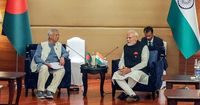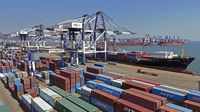In a significant diplomatic shift, India has revoked a critical transshipment facility that allowed Bangladesh to export goods to third countries via Indian land customs stations. This decision, announced by the Central Board of Indirect Taxes and Customs (CBIC) on April 8, 2025, follows controversial remarks made by Bangladesh's Chief Adviser, Professor Muhammad Yunus, during his recent visit to China.
Yunus, who served as the interim leader of Bangladesh, asserted that India’s northeastern states are a "landlocked region" and positioned Bangladesh as the "only guardian of the ocean" for this area, suggesting that this could pave the way for increased Chinese economic influence in the region. His comments provoked a backlash in India, leading to the suspension of the transshipment facility, which was initially established in 2020 to facilitate smoother trade flows for Bangladeshi exports to countries such as Bhutan, Nepal, and Myanmar.
The CBIC's circular rescinding the 2020 order stated that the transshipment arrangement had resulted in significant congestion at Indian airports and ports, causing logistical delays and higher costs that hindered India's own exports. "The facility has been withdrawn with effect from April 8, 2025," the circular noted, adding that cargo already in Indian territory would be allowed to exit according to existing procedures.
Trade experts have indicated that this decision is likely to disrupt Bangladesh's export logistics, particularly affecting its trade with landlocked neighbors Nepal and Bhutan. Ajay Srivastava, founder of the Global Trade Research Initiative (GTRI), highlighted that the previous mechanism provided a streamlined route through India, significantly reducing transit time and costs. Without it, Bangladeshi exporters could face logistical challenges and increased costs, which may lead to uncertainty in their trade operations.
During his four-day visit to China from March 26 to 29, Yunus emphasized the strategic importance of Bangladesh in the context of Northeast India, stating, "The seven states of India, the eastern part of India, are called the Seven Sisters. They have no way to reach out to the ocean. We are the only guardian of the ocean for this entire region. This opens up a huge opportunity for us. It could become an extension of the Chinese economy." His remarks were perceived as an overture to Beijing, raising concerns in New Delhi about the implications for regional security and economic balance.
In reaction to Yunus's comments, Indian officials expressed their discontent. Assam Chief Minister Himanta Biswa Sarma condemned Yunus's statements as "offensive" and argued that they reflect a persistent vulnerability narrative associated with India's strategic "Chicken Neck" corridor, which connects the northeastern states to the rest of India. Sarma called for the development of better transport networks to enhance connectivity for the northeastern region.
The termination of the transshipment facility is expected to have broader economic implications. The Indian Ministry of External Affairs clarified that the rollback of this facility does not impact Bangladesh's exports to Nepal or Bhutan that transit through Indian territory. However, the move is anticipated to benefit several Indian export sectors, including textiles, footwear, and gems and jewelry, where Bangladesh has been a formidable competitor.
Trade relations between India and Bangladesh have been strained since the political upheaval in Bangladesh, which saw former Prime Minister Sheikh Hasina resign amid mass protests last August. The interim government led by Yunus has struggled to maintain stability, further complicating bilateral relations. In the wake of the political crisis, Yunus has sought to strengthen ties with China, inviting Chinese investment to revitalize the airbase at Lalmonirhat, located near India's strategic Siliguri Corridor.
Experts have raised concerns that India's decision to withdraw the transshipment facility could contradict its commitments under World Trade Organization (WTO) provisions, particularly Article V of the General Agreement on Tariffs and Trade (GATT) 1994, which mandates freedom of transit for goods to and from landlocked countries. This aspect of the decision could potentially lead to disputes at the international level, especially as Nepal and Bhutan may voice their concerns over restricted access to trade with Bangladesh.
As India navigates its complex relationship with Bangladesh, the recent developments underscore the delicate balance of regional diplomacy, trade interests, and geopolitical strategies. The implications of Yunus's remarks and the subsequent withdrawal of the transshipment facility could have long-lasting effects on trade dynamics in South Asia.
In summary, the revocation of the transshipment facility marks a critical juncture in India-Bangladesh relations, reflecting the intersection of economic interests and geopolitical considerations. As both nations grapple with the fallout, the future of their trade ties hangs in the balance, highlighting the importance of diplomatic dialogue in addressing regional challenges.









